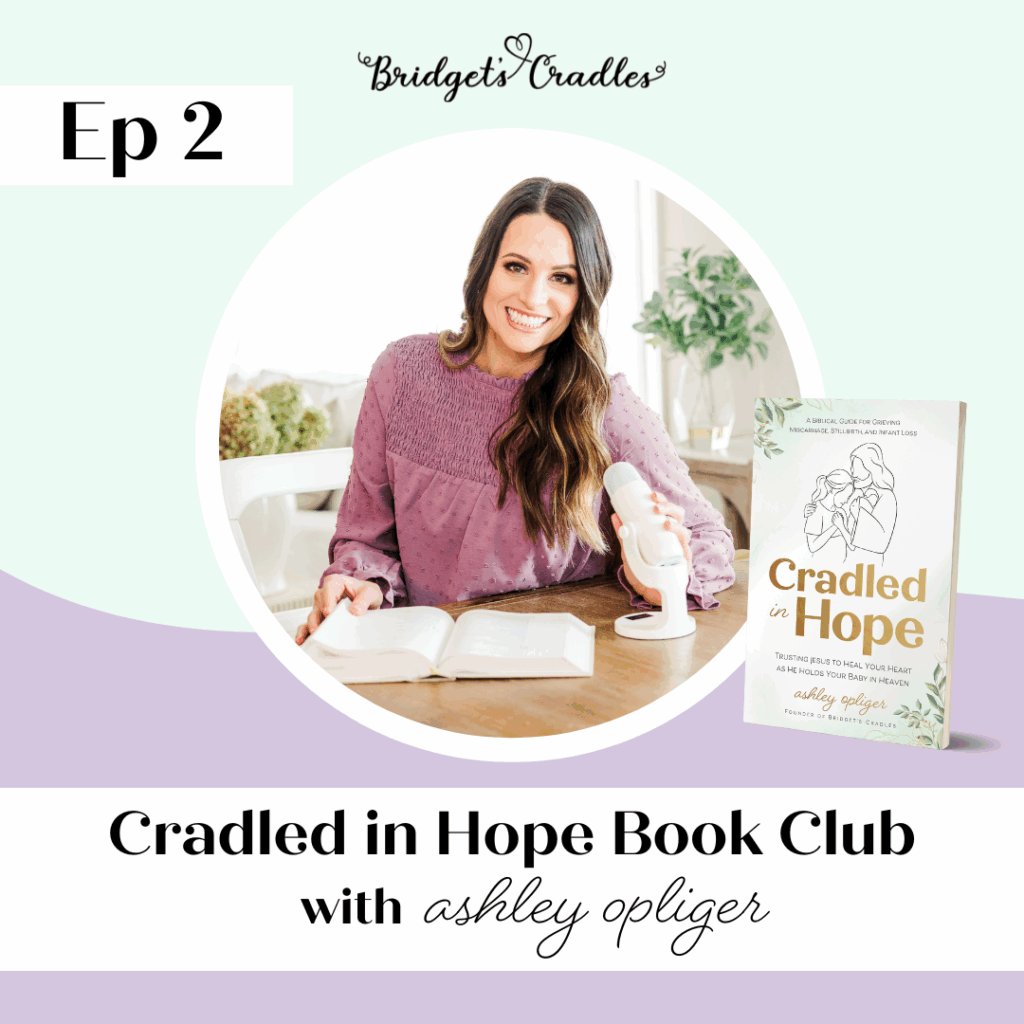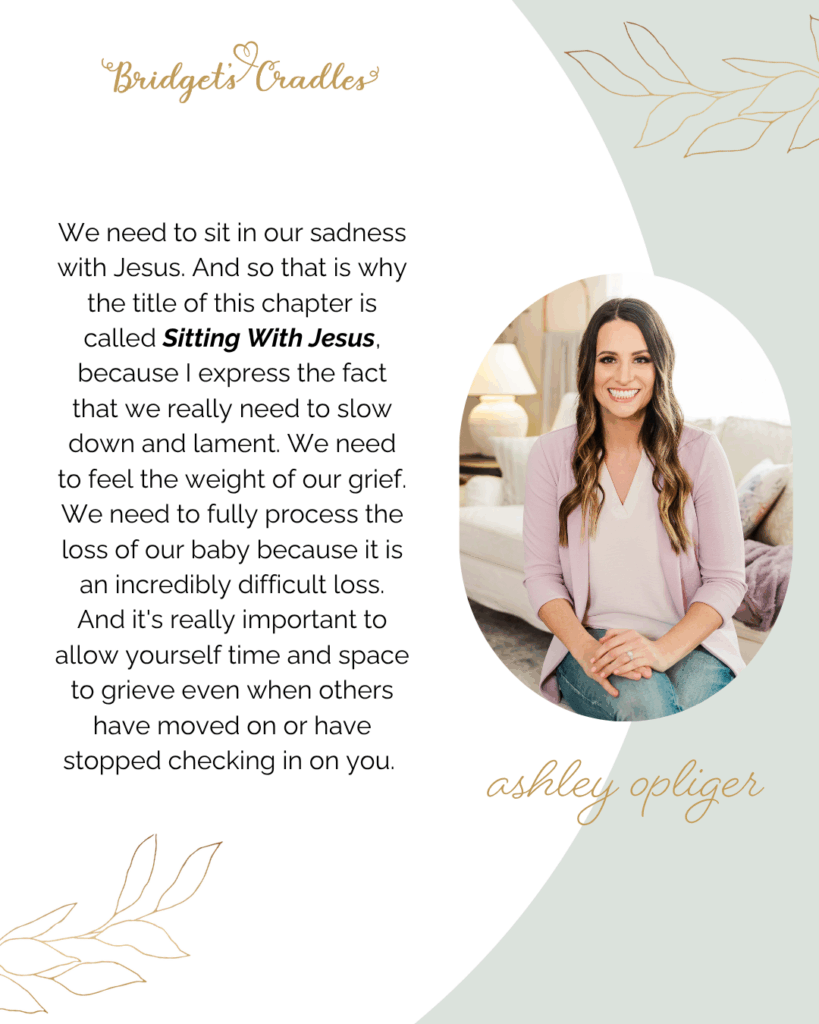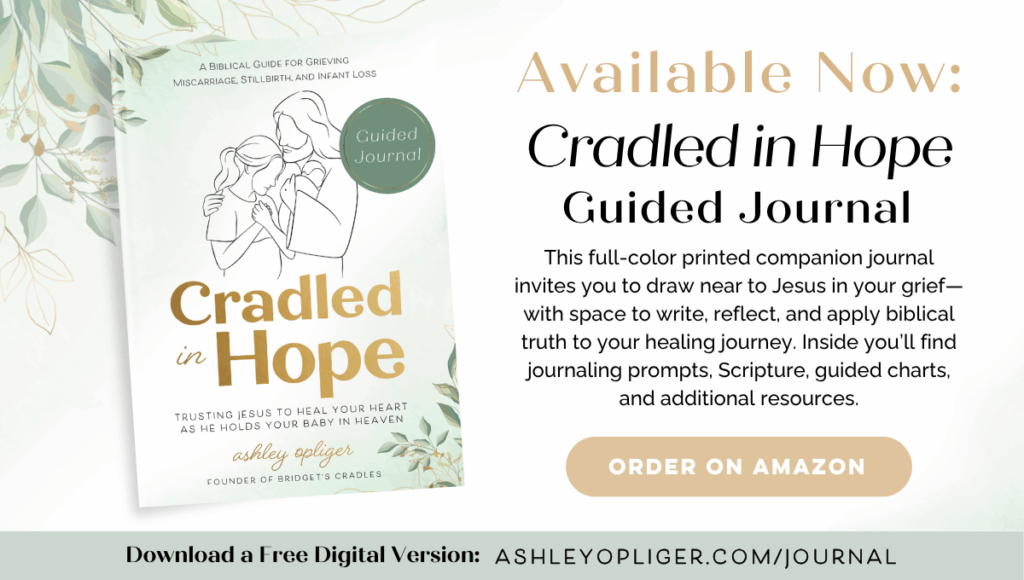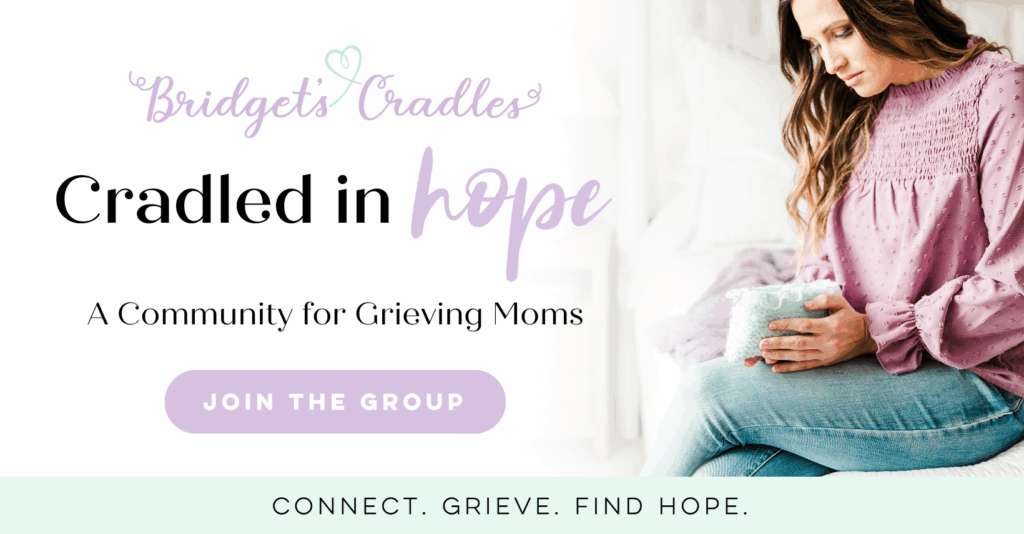Wave of Light | October 15, 2025 Register Now
registration open!

In this episode, Ashley reflects on the raw emotions that come in the early days of grief after pregnancy or infant loss. Centered on Chapter 1 of Cradled in Hope, “Sitting with Jesus | When You Are Overwhelmed with Sadness,” she invites grieving moms to slow down, feel the weight of their sorrow, and meet Jesus in their pain.
Ashley explains how grief is not just sadness—it’s love. She encourages moms to express that love in healthy, meaningful ways that honor their baby in Heaven. With personal stories, biblical wisdom, and practical survival tips, this chapter is a gentle invitation to sit in the sadness with Jesus, who grieves with us and comforts us in our sorrow.
In this episode, Ashley shared:
- Real reflections from grieving moms on what grief feels like
- How grief is rooted in love, and why the pain is so deep when death has separated us from our baby
- Personal experiences from the early days after Bridget’s death, and how Ashley found healing in the quiet space of sitting with Jesus
- The cultural and personal pressures to “move on” from grief—and why true healing requires slowing down and lamenting
- Practical ways to survive the early days of loss, including self-care, sleep, nutrition, and realistic expectations
- Why Jesus is the safest place for our grief and how He connects us directly to our babies through His Spirit
- Biblical truths from the story of Elijah and Jesus’ promise to comfort those who mourn (Matthew 5:4)
Ashley reminds us that grief is rooted in deep love—and that we don’t have to hide our pain or rush our healing. With compassion and honesty, Ashley encourages grieving moms to let the tears fall and begin learning what it means to grieve with Jesus, one breath and one day at a time.

Journaling Prompt
What does grief look like in your life? What does it feel like? Write down a list of words that come to mind when you think of the word grief.
Healing Step
Spend time expressing your love for your baby in Heaven. Choose an idea from Chapter 1 or download the free Memorial Ideas for a Baby in Heaven eBook when you get the Cradled in Hope Guided Journal. If you’re using the printed version, you can also find the eBook at bridgetscradles.com/e-books.

Full transcript below.

New episodes will be shared on the 1st of every month. Don’t miss a single episode…subscribe wherever you podcast!
Please also leave a review to help spread the message of hope with other grieving mommas!

MEET OUR HOST
Ashley Opliger is the Executive Director of Bridget’s Cradles, a nonprofit organization based in Wichita, Kansas that donates cradles to over 1,600 hospitals in all 50 states and comforts over 30,000 bereaved families a year.
Ashley is married to Matt and they have three children: Bridget (in Heaven), and two sons. She is a follower of Christ who desires to share the hope of Heaven with families grieving the loss of a baby.
Connect with Ashley:
Facebook /ashleyopliger
Instagram @ashleyopliger
Pinterest /ashleyopliger
www.ashleyopliger.com
Follow Bridget’s Cradles:
Facebook /bridgetscradles
Instagram @bridgetscradles
Pinterest /bridgetscradles
www.bridgetscradles.com
JOIN OUR FACEBOOK GROUP FOR GRIEVING MOMS

EPISODE TRANSCRIPT
Ashley Opliger: [00:00:00] Welcome to the Cradled in Hope Podcast Book Club.
I’m your host, Ashley Opliger—grieving mom, author of Cradled in Hope, and founder of Bridget’s Cradles. I’m so honored to walk with you through my book, one chapter at a time, as we navigate the heartbreak of losing a baby together.
After my daughter Bridget went to Heaven at 24 weeks, I wrestled with deep sadness and complex questions about God’s goodness. But through that grief, Jesus showed me that He not only cradles our babies in Heaven, He also holds our broken hearts here on earth.
Whether you’re reading along or simply listening in, this is a safe space for your sorrow—a place where your tears, questions, and raw emotions are welcome. Each episode, we’ll reflect on a chapter of Cradled in Hope and gently walk together from heartbreak to healing, and from pain to purpose.
My prayer is that this podcast will remind you that you are not alone in your grief and, most importantly, that it will point you to Jesus, the only One who can truly heal your heart. Through faith in Him, there is hope to see your baby again, and He will be with you every step from here to Heaven.
So wherever you are in your journey, I invite you to join me—and together, we will grieve with hope.
Let’s begin.
Ashley Opliger: [00:01:23] Hi friends. Welcome back.
Today we are diving into Chapter One, Sitting With Jesus: When You Are Overwhelmed With Sadness. This first chapter focuses on grief, what it is, how it feels, and ways we can grieve in the early days of pregnancy and infant loss.
[00:01:42] I start this chapter with a story about a group of grieving moms gathered in our headquarters in Kechi, Kansas, and I had asked this group of women who were gathered together for one of our support groups at Bridget’s Cradles, I had asked them to write down what they thought grief was, words that described grief.
[00:02:06] I passed out some note cards and some pens, and everybody sat there, and they wrote down words that described grief. And so I’m going to share some of the answers that the moms in our support group shared. But overwhelmingly, all of the words that were used to describe grief were negative, which obviously grief does not have a positive connotation.
[00:02:30] But we’re going to talk a little bit more about what grief really is, and so here are the words that the grieving moms shared. We wrote down these words: pain, loss, suffering, sadness, crying, darkness, unpredictable, never-ending, lonely, heavy, rollercoaster, empty, deep, broken, heartache, uncontrollable, sorrow, shattered, hollow, consuming, absence, nightmare, despair, agony.
[00:03:09] I actually read some of the words that I listed in my book and not all of them, and I shared them at random. But as you can tell, all of these words are very sad words that describe how distressing grief feels.
[00:03:24] And what I mention in the book is that grief feels like pain, but if you really uncover its source and you figure out really where the grief is coming from, you discover that the source of grief is love and, if I could be as bold to say, grief is love.
[00:03:45] And so all of the words that we had written down were really just the symptoms of grief. It’s what it feels like. But the reason that we grieve is because we love and miss someone so much, and it feels like there’s nowhere for our grief to go because we can’t physically love them in person.
[00:04:06] Our role as a mother is to protect and nurture our child, and so when we can’t protect and nurture them in the flesh, the way that we can do that is to protect and nurture their memory. And I talk a lot in the book about different ways that we can honor our baby’s memory.
[00:04:25] But if I could just share a little bit more, expand on the grief is love, because that is a big focus of this chapter because love is very powerful. And the reason that grief is so intense and overwhelming is because love is so powerful.
[00:04:45] And so here’s something that I wrote down in this chapter. This is on page 36. I said, “The day Bridget was born into Heaven was both the best and worst day of my life. Though I was overwhelmed with sadness over her death, the prevailing emotion I felt while holding her was love, the unconditional, all-consuming love of a mother.”
[00:05:09] And so as I reflect on the day she was born, I do think about how I was just consumed with loving her and wanting to soak up our time with her, but yet at the same time, heartbroken and grief-stricken over the fact that she had gone to be with Jesus, and that we weren’t going to be able to raise her here on earth.
[00:05:28] And so we really do grieve because we love, and sometimes it feels as though when you’ve lost a baby or a loved one, you feel like you have all this love inside of you, and then it’s like, where is that supposed to go?
[00:05:43] You had intended for this baby to be born and for you to bring them home and to love them and to raise them, and then all of a sudden, all of those hopes and dreams are dashed and you feel as though you have all this love, a lifetime of love for your child that you had planned to give them and then they’re not here. And so where does that love go?
[00:06:04] And so that is a big part of this chapter, is just talking about those emotions of grief and what do we do with that? And so often, I feel like when you’re grieving, you need a place to take that grief.
[00:06:19] And so throughout this chapter, I talk a lot about how sometimes you need a place to go in grief. So whether that’s your baby’s grave, if your baby is buried at a cemetery, or a memorial garden, or in your church or a counselor’s office, it might even be just her bedroom, some place where you can go and grieve.
[00:06:38] But what’s even more important than having a place to go is having a person to meet you there. And it will come as no surprise as to who I’m going to tell you that I want you to meet in your grief, but that person is Jesus because He is the ultimate source of love.
[00:06:56] He is the One who created your baby and promises those who believe in Him that they will spend eternity with their baby in Heaven. And He is Emmanuel, the God who is with us. That’s from Matthew 1:23. We know He has never left us, and He will not forsake us in our time of grief.
[00:07:13] And so through this journey, we want to be walking with Jesus and sitting with Jesus in our sadness. Because grief is so painful that we don’t want to feel grief, we try to avoid it. And that’s very normal, by the way, if you’re experiencing that.
[00:07:30] I am not immune to that. Even walking through the grief of Bridget and leading support groups all these years, when my dad went to Heaven all of a sudden, again, reminded me how painful grief is and how oftentimes our brains will try to protect us from that pain.
[00:07:47] And so we’ll do things to distract ourselves. We’ll try to keep busy. Some people might turn to unhealthy coping mechanisms such as drinking, doing drugs, overeating, overspending, mindless scrolling, being promiscuous, self-harming, or acting out of character.
[00:08:04] These are things that we do to numb our pain because feeling pain is painful, and I know that sounds like an overly simplistic way to explain it, but it is. It’s painful to feel our feelings and the weight of our loss. The loss of a baby is so traumatic, and so there’s so many layers of grief when you lose a child. And so to actually process that and sit in that, it’s going to be very difficult.
[00:08:33] But some of it also is because we have a culture that is also pressuring us to be strong and to move on and to get over it and to stop talking about it. And so when we have not only internally, this feeling of, “This is painful, I don’t want to experience this,” and we have the culture and family and friends and co-workers that are wanting us to get back to normal and to pretend like nothing happened, it’s easy for us to stuff our feelings down and to just move past. And that’s not how we’re going to heal.
[00:09:09] We need to sit in our sadness with Jesus. And so that is why the title of this chapter is called Sitting With Jesus, because I express the fact that we really need to slow down and lament. We need to feel the weight of our grief.
[00:09:26] We need to fully process the loss of our baby because it is an incredibly difficult loss. And it’s really important to allow yourself time and space to grieve even when others have moved on or have stopped checking in on you.
[00:09:42] One thing that I’ve found in grief is that so often the support from other people comes on strong in the beginning and then just starts to wear off over time, and you feel so alone and you wonder if that means you should just move on as well, because everyone else has seemed to move on.
[00:10:00] But I need to assure you that it is so important to spend this private season with the Lord and to really feel the weight of your sorrow. And so I talk about how after Bridget was born, she was born October 22nd, 2014, my employer allowed me the rest of the year off.
[00:10:20] They basically gave me a maternity leave, and that was so helpful because I was able to be off of work through Thanksgiving and Christmas, and then I went back to work in the new year. And that time period was so important for me because I was basically by myself, because all my friends were at work and my husband was back at work.
[00:10:40] But it was really helpful for me to have time to just grieve and to sit in my sadness. I remember just sitting in my living room and journaling and crying and praying. And yes, it was sad and lonely and, at times, depressing. But I was so grateful that I had that time because I feel as though that time really helped me have a foundation for the rest of my grieving journey, that I allowed myself that time and let myself feel the weight of my sadness.
[00:11:14] And I know that so many employers are not that gracious and that so many of you lost a baby and then you were basically forced to go right back to work, or you have other living children you had to take care of, and so you did not have the opportunity to sit in your living room and to just cry and journal and pray.
[00:11:34] And please hear my heart to say that I grieve with you that you are in that position, because I know how hard it is to have to maintain a house, to take care of children, to focus at your job, and to be around your co-workers again, when you’re grieving and it feels like your entire world has fallen apart.
[00:11:53] I know what that feels like. I’ve been through that this past year, and I just want to say I’m so sorry because I know that it can be very hard to allow yourself time and space to grieve with the demands of your regular life and your routine.
[00:12:09] And so I have a section in my book called Survival Mode, and it’s very simplistic ideas on how to take care of yourself in the early days of grief, because when you’re in those early, fresh waves of grief, you are just trying to survive. You are going through the motions.
[00:12:29] And I found that it was hard for me to do basic life functions like sleeping and eating. Those things were hard for me to do, and so I have a lot of practical ideas in this chapter on how to get through the days.
[00:12:45] And you know that this book is a very biblically-based book. There’s a lot of theology, there’s a lot of biblical truth and hope throughout the book. But this section particularly is just very practical, because it is biblical to address our physical needs.
[00:13:02] And so I actually talk about Elijah when he was suffering in the wilderness. And this is in 1 Kings 19. And if you recall the story, he sat under a tree, and he prayed that he would die. And Elijah fell asleep, and God sent an angel to offer him food and drink.
[00:13:19] And if you think about how the angel ministered to him, it was in a physical way. Elijah needed a nap, and he needed some food. And honestly, the same is true for you and for me.
[00:13:31] When you are grieving, it is so hard to handle the weight of your emotions, when you’re physically exhausted, you’re not sleeping at night. I know for me, when I’m grieving, I have a hard time falling asleep and staying asleep.
[00:13:46] I’d often wake up very early in the morning and not be able to go back to sleep, and then I’d be up so early that I’d be tired later in the day, and then I might end up taking a nap, and then I have a hard time falling asleep.
[00:13:57] And it’s so hard to take care of yourself. It’s hard to eat healthy, it’s hard to exercise. If you were doing those habits before the loss of your baby, I know a lot of times it can be really hard to get back into those routines, especially because grief zaps your energy, and you don’t feel like doing those things anymore.
[00:14:15] And so oftentimes, we want to turn to junk food and processed food to have an easy way to get food. And I say that not to shame anyone, if that’s you, because that has been me. That has been me. And so I share in the book about some ideas on some whole food nutrition and protein sources that have been easy for me.
[00:14:38] And lots of different ideas in here, just also grace for knowing that during this season when you’re sitting with Jesus in your sadness, and you’re trying to make it through the day, changing your expectations of yourself and what you can do in a day,
[00:14:55] I know for me, I am a very high-achieving, productive kind of person. I like to do a lot of things in a day, and when I’m grieving, I just can’t. I cannot be as productive as I used to be. And then I would just shame myself, “What’s wrong with me? Why can’t I do the things that I used to do?”
[00:15:13] And so I am here to say this from my own personal experience and from what I know from the Bible, that there is no condemnation in the Lord Jesus, that you have to give yourself grace in this time that you are not going to be your normal self.
[00:15:29] You’re not going to be able to do the things that you used to do. You’re not going to be able to do as much as you used to do. And you have to give yourself grace because right now, you are just trying to get through the waves of grief as they crash against you. There is a lot of practical help in this chapter, but there’s also some ideas on how to grieve.
[00:15:53] We hope you’re finding encouragement in this episode so far. We want to take a moment to share some resources our ministry offers to support grieving moms like you.
On our website, bridgetscradles.com, you’ll learn more about our nonprofit and find many hope-filled resources, including free e-books to help you plan a memorial or funeral service for your baby, meaningful ways to honor your baby in your heart and home, and gentle guidance for navigating difficult days like due dates, Heaven Days, and holidays.
We invite you to join our community of grieving moms through our Christ-centered support groups, offered both in-person at our headquarters near Wichita, Kansas, and virtually through Hope Online. These gatherings provide a place to find comfort, connection, and biblical hope alongside other moms who understand your pain.
You can view upcoming dates and sign up on our website. While you’re there, we’d also be honored for you to share your baby’s story with us.
For ongoing support, we welcome you to join our private Cradled in Hope Facebook group—a safe space for grieving moms to find friendship and walk their healing journey together.
To stay connected with us and receive faith-filled encouragement, follow us on Facebook and Instagram at @bridgetscradles, @cradledinhope, and my personal page @ashleyopliger.
Now, let’s get back to the episode.
[00:17:13] Coming back to the idea that grief is love and love is a verb, love is an action. We show people love by the words that we say and the things that we do.
[00:17:23] And so with our baby being in Heaven, it’s hard to show our baby that love. And I talk about different ways that you can grieve and show love to your baby because showing love to your baby when they’re in Heaven is different than if they were on earth. But there are still many fulfilling and satisfying ways that you can show your baby that you love them.
[00:17:44] And let me address this because some people might think, “Why would you do that? Your baby has died. They’re not here, so why would you be interested in showing them that you love them?”
[00:17:56] And this is where the hope of Heaven and the hope of eternity and where our Christian faith comes into play, because we are not grieving like the rest of mankind that believe that there’s no life after death.
[00:18:09] We do believe that our babies are in Heaven and that they’re alive right now, and that we’re going to be reunited with them and that they’re part of our Kingdom family.
[00:18:17] And so if that is true, and we’re getting that truth from the Bible, then why would we not show our love and go about our lives in a way that acknowledges that yes, they are alive, and yes, I will see them again?
[00:18:32] And so some of the ideas that I share here, some of them are specific on how you can express your love for your baby, and then others are ways to express your own grief.
[00:18:43] And some of them might seem a little simplistic, like crying. And I know it’s, “Wow. What novel advice,” right, “to share in a book.” But so often I think we hold back our tears. We hold them back, we push them down even when we’re by ourselves, even when there are no other people around.
[00:19:01] I know speaking for myself, there’s been so many times where I have felt so overwhelmed and so sad, and I wanted to cry, but I’m just like, “You know what? I’m strong. I’m going to get through this. I’m just going to keep pressing on. I’m going to do the next thing. I don’t have time to sit here and cry.”
[00:19:20] And that is so not true. I do need to sit and cry because the tears are a way to release the sorrow. And so I say crying is a healthy way to pour out your heart’s sorrow for your baby, and that giving myself one really good cry a day, especially in the early days of grief, was so helpful to me.
[00:19:41] Sometimes I’d have to schedule it, and by schedule I don’t mean that I actually put it on my calendar, but that I would say to myself, let’s say I was out running errands and I was feeling really sad. I’d say to myself, “When I get home, before I go jump on my computer or go do something else, I am going to sit and process my grief and I’m going to let myself cry.”
[00:20:03] And I think that is so important because if, every time our brain and our heart, they’re trying to tell us that we are sad, and then we try to avoid expressing or releasing those emotions, I think we are denying ourselves a little bit of healing in that moment.
[00:20:24] And so I talk about also spending time with pictures or ultrasounds of your baby or cuddling up with a teddy bear or something that touched your baby, like a blanket or a cradle if you received one of our cradles.
[00:20:38] You could also do things in their memory like planting flowers or a tree, or visiting your baby’s grave and decorating around their headstone. For those of you who are apart from your baby’s remains, it might be helpful to have a memorial space, like a garden or a little bookshelf in your home that you can place memorial items so you have a place to go and remember and reflect about your baby.
[00:21:02] Each person is different. And so I do say in this chapter that all of the ideas that I share, they are very much meant to be ideas and not a checklist, because I think it becomes problematic when we treat grief like a checklist. “Okay, I need to do this and do this,” or, “someone else said I needed to do this, and so I’m going to do that.” And really, each person grieves differently.
[00:21:28] I used to say there’s no wrong way to grieve. There definitely are wrong ways to grieve. There are unhealthy ways to grieve, but there are many healthy ways to grieve, and everybody’s going to have different ways that they want to celebrate and honor their baby, and different ways that they feel most comfortable expressing the grief.
[00:21:48] Some people, it might be crying, it might be journaling, it might be worshiping, it might be going to your baby’s grave. But really, the most important thing is that you find healthy ways to practice lament.
[00:22:03] And so the Hebrew word for lament means to wail or cry out. And you can read more about lament in the book of Lamentations, the Psalms, and the book of Job, but essentially lament is just being present with God and expressing your heart and your sorrow.
[00:22:23] And so what’s important here is that you go to your Heavenly Daddy, who is a good Father, who loves you, and He longs to comfort you, and that you take your sorrow to Him and you sit with Him and you give yourself time with Him because this is a beautiful truth that I share in the book. I said, “Bridget is in Jesus’ physical presence in Heaven, and as a follower of Jesus, His Holy Spirit is in me. So this means that we are both in His presence, meaning Heaven is much closer than we think. Jesus directly connects us to our babies through His Spirit.”
[00:23:02] So He is the conduit that carries my love to Bridget. And so that is why I said Jesus is who we need to take our grief to because He’s the One holding our babies, and He is inside of us. And so He is a direct connection. He is our mediator to send our love to our baby.
[00:23:20] This episode we are going to do one Time With Jesus journaling prompt and one Healing Step from the book. The journaling prompt that I want you to think about is: What does grief look like in your life? What does it feel like? Write down a list of words that come to mind when you think of the word grief. So that’s going back to the beginning of the chapter, when I mentioned the list of words that the mothers in our support group wrote down.
[00:23:50] And then the Healing Step for this chapter is to spend some time doing something to express your love for your baby. Pick an idea mentioned in this chapter or from the Bridget’s Cradles e-book, Memorial Ideas for a Baby in Heaven that comes as a resource when you download the free Cradled in Hope Guided Journal from my website, ashleyopliger.com/journal.
[00:24:12] If you are using the printed version of the journal, which is available on Amazon, you can get that Memorial Ideas free ebook on the Bridget’s Cradles website. You can go to bridgetscradles.com/e-books. There is a dash between the E and the books, e-books.
[00:24:31] We have many different e-books that are all available for free for grieving families, and so I hope that you will go check out our website and all of the different resources that we have.
[00:24:43] I am going to close this episode with one of the Truth to Cling To Scripture verses that I have at the end of the chapter. And this is Matthew 5:4, “Blessed are those who mourn, for they will be comforted.”
Jesus. I thank You so much that You sit with us in our sadness, that You are with us, and that You grieve with us because You grieve over death, and that the loss of our babies is not Your good design.
And God, I thank You that we can come before You just as we are. We can bring all of our sadness and our pain and our questions and lay it all at Your feet, and You will comfort us because Your Word says that You will, that You are Emmanuel, You are with us, and You are for us, and that You’ll weep with us.
And Jesus, I pray that You would give us time and space to meet with You, to sit in our sadness, to truly lament the loss of our babies. Jesus I thank You that they are not truly lost, that they are alive and whole right now in Your presence, and that Your Holy Spirit is inside of us, and that through You we have a direct connection to Heaven. And I thank You so much that You promise to be with us just as You are with them in Heaven.
Lord, I pray over each mom listening to this episode and reading this book alongside me, Lord, that You would be her comforter, that You would bring about healing and hope in her life, that You would bring joy back to her spirit. Jesus, I pray that You would cradle us in Your arms as You cradle our babies in Heaven. We love You. Amen.
[00:26:29] Be sure to tune in for the next episode, which will cover Chapter Two, Broken and Bleeding: When You Feel Abandoned by God.
[00:26:39] Thank you for joining me for today’s episode of the Cradled in Hope Podcast Book Club.
New episodes covering each chapter of the book will release on the 1st, 15th, and 22nd of each month through the end of the year—so be sure to subscribe and follow along.
If you don’t have your copy of Cradled in Hope, you can find it wherever books are sold. It’s a biblical guide for grieving moms after miscarriage, stillbirth, or infant loss—filled with vulnerable emotion, biblical wisdom, practical guidance, and hope-filled encouragement.
To accompany the book, I’ve also created the Cradled in Hope Guided Journal—a beautiful companion that includes space to write your responses to the discussion questions, full Scripture passages from each chapter, and additional reflection pages and guided charts to help you process your grief and draw you closer to Jesus. You can download the free digital version on my author website at AshleyOpliger.com/Journal, or order the printed version on Amazon if you prefer to write by hand.
Until next time, know that you are not alone. You are seen, loved, and Cradled in Hope.
I have a fancy professional bio here, but what is most important for you to know is that my first and only daughter, Bridget, went to Heaven and Jesus was the only One who could put the shattered pieces of my heart back together. Maybe your heart is broken too?
If so, I'm here to be your friend and walk with you on your grief journey. More importantly, I'm here to point you to Jesus, the only One who can heal your heart and promise you eternity with your baby in Heaven. Hold my hand, friend, and let's start this journey together.
I'm a grieving mom who found comfort in Christ.
Welcome, I'm so GlaD You're Here
More Stories That May Speak to Your Heart
Additional Reads
Spotify
Apple
Ways To Listen
Hosted by Ashley Opliger, this podcast offers Christ-centered comfort to moms grieving the loss of a baby in Heaven. Each episode is rooted in Scripture and points your heart to the truth of the Gospel, the presence of Jesus, and the eternal hope of being reunited with your baby in Heaven.
Listen to Our Podcast
welcome to cradled in hope
Donate Online
Make an eternal impact. Your donation comforts grieving families with cradles, support, and the hope of Christ.
Find a Community
You don’t have to walk this road alone. Join a Christ-centered community of moms who understand your grief.
Read the Book
Discover comfort, hope, and biblical encouragement in Cradled in Hope, written by Ashley Opliger for grieving mothers after baby loss.
Christ-Centered Comfort and Guidance for Grieving Families
Honor your baby’s memory with kindness. Explore 50 thoughtful ideas—plus a free customizable RAK card to share their legacy of love.
Random ACts of Kindness in Memory of a Baby in Heaven
Find meaningful ways to honor your baby on birthdays, due dates, and holidays—offering remembrance through cherished traditions.
Honoring Your baby on Milestones and Holidays
Offer support to a grieving parent with practical ways to help and 12 heartfelt gift ideas designed to bring comfort during deep loss.
Supporting a Loved One After the loss of a baby
Navigate life after loss with gentle guidance for grieving, healing, and finding hope in the midst of heartbreak.
Grieving and Healing After the Loss of a Baby
free e-books
Grab your free copy
How To Grieve & Heal After The Loss of a Baby
Find hope in the heartbreak of pregnancy and infant loss. This guide offers practical ideas and faith-filled next steps in navigating a path forward in your grief.





